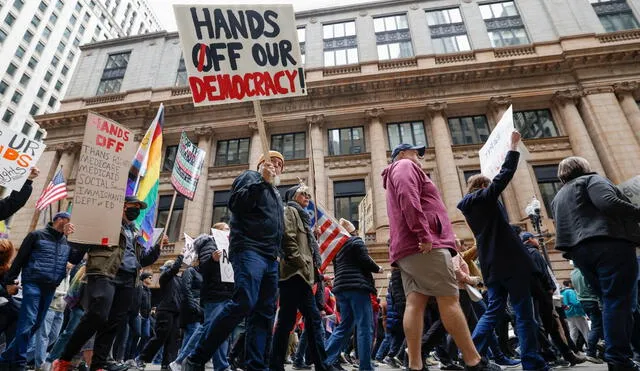Thousands protest against Trump across U.S. over threats to democracy
This marks the second wave of nationwide protests against President Donald Trump, as growing concerns mount over his assaults on democratic institutions and the independence of the judiciary.

Thousands of people across the United States took to the streets in protest against President Donald Trump. Demonstrations were organized in major cities such as New York, Los Angeles, and Washington, D.C. Protesters expressed fears that a second Trump presidency could endanger American democracy. They carried signs denouncing authoritarianism and demanding the defense of democratic values. Many emphasized the importance of voting to prevent Trump's return.
The rallies were part of a national movement organized by various progressive groups and civil society organizations. The initiative, called “Not Above the Law,” gathered people under a common message: that Trump must be held accountable. Organizers highlighted Trump's ongoing legal battles and claimed that his campaign threatens constitutional norms. Speeches at the events warned against normalizing political extremism. They urged Americans to protect their rights and freedoms.
Protesters warn of rising authoritarianism and call for justice reform in U.S.
Many protesters referred to Trump’s role in the January 6 Capitol riot, viewing it as a turning point in U.S. history. They described his continued influence as dangerous and accused him of trying to subvert democratic institutions. Some speakers compared the current political climate to past authoritarian regimes. The call to resist fascism and preserve democracy was a recurring theme. Activists stressed that silence and inaction could have serious consequences.
Demonstrators also expressed concern about the Supreme Court and other institutions they believe are being politicized. Several mentioned issues like abortion rights, voter suppression, and racial inequality. These protests were not only anti-Trump but also focused on broader systemic issues. Participants demanded reforms to ensure justice and equity for all citizens. Youth and minority groups had a strong presence in the marches.

ALSO SEE: This Liberty Head Nickel could be worth over $74.000: One of the most valuable Coins in America
Peaceful protests signal growing mobilization to defend democracy ahead of 2024 election
Law enforcement authorities monitored the events, which were largely peaceful, though heavily attended. Police departments in multiple cities reported no major incidents or arrests. The peaceful nature of the rallies was seen as a reflection of civic responsibility. Organizers stressed nonviolence and democratic engagement. The events concluded with calls to register to vote and stay politically active.
These protests come at a critical moment in the lead-up to the 2024 U.S. presidential election. Trump remains a polarizing figure, leading the Republican field despite his legal troubles. Opponents worry that if re-elected, he could undermine democratic institutions even further. The widespread turnout signals growing mobilization among Americans who fear a regression of rights.












